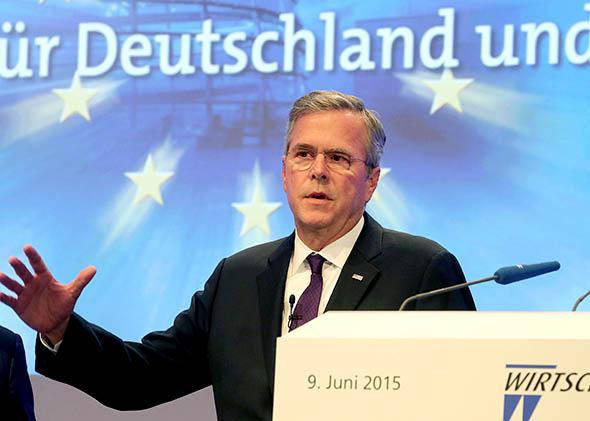Every presidential candidate must perform certain compulsory exercises. One is that you must write a book. Another is that you must make a high-profile trip overseas, most likely to Europe or Israel. Candidates travel to foreign capitals so that they can look presidential. They wear their best suit, shake hands resolutely, and sit at long tables with good posture. We see the president shaking these hands and sitting at these tables a lot of the time, so if a candidate dresses up and plays president, we might think he’s fit for the job. These trips also allow the candidates to claim greater foreign policy wisdom. So, for example, if you ask Wisconsin Gov. Scott Walker about foreign policy, he will tell you about his recent trip to Israel. And it works for him. Here’s the first paragraph of a Des Moines Register story: “Fresh off a trip to Israel, Wisconsin Gov. Scott Walker told a crowd in West Des Moines that what he saw there only reaffirms his belief that America should take a stronger stance against terrorism.”
It’s fine to travel and give a speech, but these foreign forays are an attempt to turn a trip through customs into competence. That should make us suspicious, but for Republicans it poses two additional challenges. First, it suggests that competence is related to the number of stamps in your passport, which enters you into a competition with Hillary Clinton, whose passport probably looks more like a phonebook. Second, it means you’re following Sen. Barack Obama’s strategy in 2008. Republicans criticized Obama’s trip to Berlin that year as a meaningless show and complained his trip to Iraq told us nothing about his ability to understand foreign policy.
Republican presidential candidate Carly Fiorina gets big applause at GOP gatherings when she punctures Clinton’s boast about all the traveling she’s done. “Like Hillary Clinton, I too have traveled hundreds of thousands of miles around the globe. But unlike her, I have actually accomplished something.” The message is clear: Air miles are meaningless. If that’s true, and travel in the service of your country tells us nothing, then it must certainly be true that trips conceived by candidates to foreign capitals for photo ops are even less meaningful.
Obama took this practice of foreign circus shows to extravagant heights when he headed to Berlin in 2008. His message was that he would be the antidote to George W. Bush. He did not need to go to Europe to deliver this message. The point, however, was to show how much the world would adore an antidote to a president who at the time had a 30 percent approval rating on foreign policy. It was a particularly useful stunt when 200,000 people showed up to hear him speak. It showed that he might improve America’s standing in the world, an idea that appealed to a lot of voters.
This week Jeb Bush traveled to Berlin to present himself as the antidote to Obama. It too was a show (though nothing close to Obama’s display) meant to convey that he would be strong and wouldn’t let Vladimir Putin get away with any more shenanigans. It was destined to be a less convincing performance than Obama’s because Bush doesn’t have the clear shot that Obama had when he took his trip. The public doesn’t overwhelmingly approve of President Obama’s handling of foreign affairs—46 percent approve, and 49 percent disapprove—but that’s nowhere near the condemnation George W. Bush faced. Also, Jeb Bush’s message wasn’t as attractive as what Sen. Obama was selling. When Obama promised to get America out of the wars it was fighting, people loved that idea. Bush preached toughness, but even his tough talk contained some of the same nuance he derided in Obama. While saying Putin was a bully, Bush also said it would be unwise to push Putin into a corner.
It is almost certain that Bush will find lots of opportunities to refer to his European tour in the days ahead, especially after he officially announces next week that he’s running for president. (Since he has been running for a while, it’s really an admission more than an announcement.) But what do these trips really tell us about the candidates? In 2008, Obama traveled to Iraq, looked commanding in sunglasses and then didn’t show any evidence that the trip had done anything other than confirm everything he believed before he got on the plane.
That is the problem with putting too much weight on these candidate trips. They promote a Holiday Inn Express theory of presidential travel. Candidates take these trips, refer to them to give ballast to their foreign policy views, but then they don’t talk about what they actually learned that gave them the expertise that they hope we see in them. Candidates want us to believe that they learned something—otherwise, why bother going?—but don’t want to admit it because anything that seems too revelatory might be a fact you should already have known.
If there’s one thing that we’ve learned about presidential candidates who become presidents, it’s that their foreign policy promises are the ones that get most shredded by contact with reality. President Clinton shamed George H.W. Bush for being too soft on China and then worked to grant China most-favored-nation status. George W. Bush promised a humble foreign policy and then launched two wars and tried to transform parts of the Middle East into a democracy. Barack Obama promised to get the United States out of wars in the Middle East. This week he announced more troops are going to Iraq to help in the fight against ISIS.
Candidates have gotten very good at choreographed foreign policy displays. History has also shown that it is very good at undoing them.
